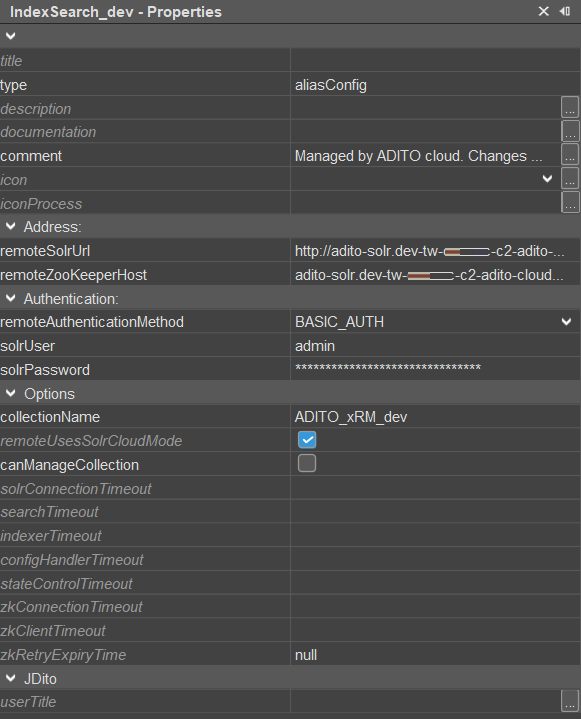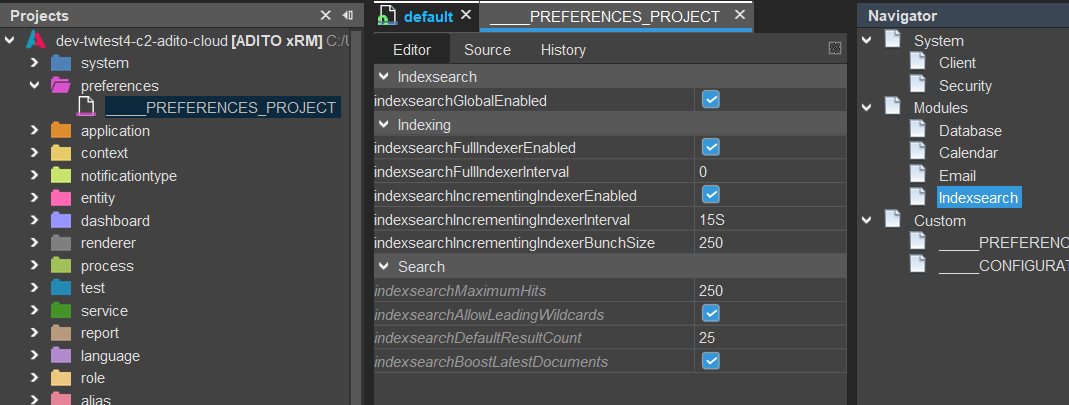Indexer configuration
In ADITO cloud systems created via the Self-Service Portal (SSP), the indexer configuration is typically predefined. This includes the setup of the Solr server. Manual adjustments are rarely necessary. However, the following sections describe how to inspect and adapt the configuration if needed.
Indexer Alias
The indexer is configured using a dedicated alias of type Index Search. To create this alias:
- Right-click the
aliasnode in your project tree and selectnew. - Assign an appropriate name (usually "IndexSearch") and confirm with
OK. - Set the type to
Index Searchand deploy the alias definition. - Open the target system, right-click the deployed alias, and select
create.
After these steps, the alias is available for configuration.

Properties
-
remoteSolrUrl
Specifies the URL of your Solr server. Ensure the URL includes the/solrpath segment. Example:http://solr.adito.local/solr -
remoteZookeeperHost
Defines the address of the Solr Zookeeper service. Even without clustering, Solr requires a Zookeeper instance. -
remoteAuthenticationMethod
Enables authentication using Solr's built-in user management. Set this toBASIC_AUTHto expose the additional propertiessolrUserandsolrPassword. This setting is enabled by default in ADITO cloud systems. -
collectionName
Sets the name of the Solr collection. ADITO cloud systems use auto-generated names (e.g.,ADITO_xRM_dev) by default. -
remoteUsesSolrCloudMode
Indicates whether Solr's Cloud API is used. The default valuetrueshould not be changed unless explicitly required. -
userTitle
Specifies the ADITO user context for executing internal JDito processes, such as the globalpatternExtensionProcess. Leave this empty unless specific user context is needed, in which case the user must exist with appropriate permissions.
Instance Configuration
To activate the index search and enable Global Search features in the client, two instance properties must be set. These are configured in the system area under:
__CONFIGURATION > Modules > Indexsearch.
-
indexsearchEnabled
Set this property totrueto enable the index search feature. -
indexsearchAlias
Select the previously configured IndexSearch alias.

Preferences
Preferences for the Indexsearch module are located in the _PREFERENCES_PROJECT data model. You can access this under the preferences node in the project tree. Inside the Navigator window, expand Modules > Indexsearch to find the relevant properties.

In the following, all properties will be described in one list:
Indexing
-
indexsearchFullIndexerEnabled
Enables or disables the full indexer. -
indexsearchFullIndexerInterval
Sets the interval for full indexer execution. Recommended to keep disabled (0) and trigger manually via a JDito process due to high resource usage. -
indexsearchIncrementingIndexerEnabled
Activates the incremental indexer, which updates the index after data changes. Should generally remain enabled. -
indexsearchIncrementingIndexerInterval
Time interval for triggering the incremental indexer. -
indexsearchIncrementingIndexerBunchSize
Number of records processed per batch by the incremental indexer. Adjust depending on system performance.
Indexsearch
-
indexsearchGlobalEnabled
-
Enables or disables the Global Search interface in the client. When disabled, the search icon is hidden.
-
indexsearchDefaultResultCount
Defines how many search results are shown inline before the full results page is displayed. -
indexsearchMaximumHits
Specifies the maximum number of total search hits displayed in the client. -
indexsearchAllowLeadingWildcards
Controls whether leading wildcards (e.g.,*term) are permitted in queries. When disabled, such patterns are automatically rewritten to match suffixes (e.g.,term*). -
indexsearchBoostLatestDocuments
If enabled, newer documents rank higher in search results. Requires:- indexsearchGlobalUseRankedSearch (expert)
Set to
trueto enable ranked search based on document recency. - a field named
DATEwith valid date/timestamp in index records
- indexsearchGlobalUseRankedSearch (expert)
Set to
-
indexsearchGlobalDefaultOperator (expert)
Sets the default logical operator (ORorAND) for search queries.
Expert parameters can override internal behavior and may degrade performance or break the system. Only adjust them with full understanding, and always test in a non-production environment first.